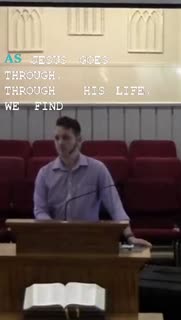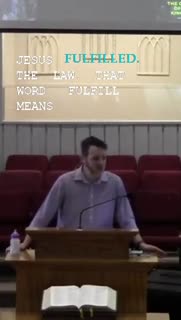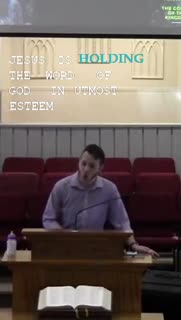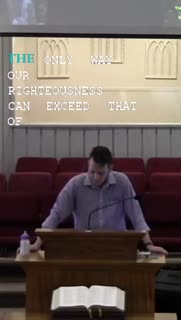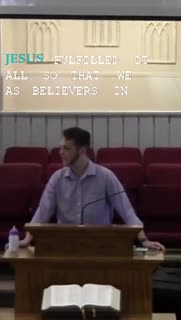Fulfillment of the Law: Righteousness Through Christ
Summary
In Matthew 5:17-20, Jesus clarifies His relationship with the Law and the Prophets, emphasizing that He has not come to abolish them but to fulfill them. This passage serves as a crucial introduction to the Sermon on the Mount, setting the stage for understanding the depth and demands of Jesus' teachings. The fulfillment of the law by Jesus is not about discarding the Old Testament but about bringing it to its intended completion. Jesus' life and ministry exemplify perfect adherence to the law, demonstrating that righteousness is not merely about external compliance but about the heart's condition.
The challenge presented is that our righteousness must exceed that of the scribes and Pharisees, who were seen as the epitome of religious adherence. This statement underscores the impossibility of achieving righteousness through human effort alone, pointing instead to the necessity of divine intervention through Jesus Christ. The law, while holy and good, serves to reveal our insufficiency and our need for a Savior. Jesus' fulfillment of the law through His death and resurrection offers a new covenant, one that is written on our hearts and not merely on tablets of stone.
The sermon calls us to examine our motivations and the ways we might be tempted to impose our own laws or standards on ourselves and others. It challenges us to rest in the righteousness of Christ, which is imputed to us through faith, rather than striving for self-righteousness. The focus shifts from legalistic adherence to a relationship with Jesus, who alone can make us righteous before God.
Key Takeaways:
1. Fulfillment, Not Abolition: Jesus came to fulfill the law, not to abolish it. This fulfillment means bringing the law to its intended purpose, showing that it points to Him and His redemptive work. The law remains holy and good, but its role is to lead us to Christ, who completes it. [10:51]
2. Righteousness Beyond the Law: True righteousness surpasses the external adherence of the Pharisees. It is not about ticking boxes but about a heart transformed by Christ. Our righteousness must come from Him, as our own efforts fall short. [42:36]
3. The Law's Purpose: The law serves as a mirror, revealing our need for a Savior. It cannot save us but points us to the grace found in Jesus. The law's fulfillment in Christ means we are no longer bound by its ceremonial aspects but are called to live by the Spirit. [22:42]
4. Heart Over Actions: Jesus emphasizes the heart's intent over mere actions. The law is not just about external compliance but about internal transformation. Our motivations and desires must align with God's will, as revealed through Christ. [30:37]
5. Living Under Grace: As believers, we are called to live under the grace of the new covenant, not under the old law. Our relationship with God is based on faith in Christ, who fulfilled the law on our behalf, freeing us from its curse. [46:15]
Youtube Chapters:
- [0:00] - Welcome
- [01:41] - Introduction to Matthew 5:17-20
- [03:34] - Prayer for Understanding
- [04:20] - Context of the Sermon on the Mount
- [05:17] - The Challenge of Jesus' Teachings
- [06:33] - The Law and the Heart
- [07:20] - Common Misinterpretations
- [08:44] - Jesus' Fulfillment of the Law
- [10:07] - The Distinction Between Destroy and Fulfill
- [12:40] - The New Covenant
- [14:24] - The Eternal Word of God
- [16:59] - The Accomplishment of Salvation
- [18:55] - The Reality of Sin
- [20:48] - The Need for Christ's Righteousness
- [23:13] - The Teaching of the Law
- [30:01] - Jesus as the Ultimate Interpreter
- [42:36] - Righteousness Through Christ
- [46:15] - Living Under Grace
- [50:41] - Invitation to Respond
Study Guide
Bible Study Discussion Guide
Bible Reading:
- Matthew 5:17-20
Observation Questions:
1. What does Jesus mean when He says He came to fulfill the law and not to abolish it? [10:07]
2. How does Jesus describe the permanence of the law in Matthew 5:18? [14:24]
3. What is the significance of Jesus stating that our righteousness must exceed that of the scribes and Pharisees? [42:02]
4. How does the sermon describe the role of the law as a mirror revealing our need for a Savior? [22:01]
Interpretation Questions:
1. What does it mean for Jesus to fulfill the law, and how does this differ from abolishing it? [10:51]
2. How does the sermon explain the concept of righteousness that surpasses that of the Pharisees? [42:36]
3. In what ways does the sermon suggest that the law points us to Christ and His redemptive work? [22:42]
4. How does the sermon interpret the idea of living under grace rather than the old law? [46:15]
Application Questions:
1. Reflect on your own life: Are there areas where you might be relying on self-righteousness rather than resting in the righteousness of Christ? How can you shift your focus to a relationship with Jesus? [48:06]
2. The sermon challenges us to examine our motivations. What are some personal standards or "laws" you might be imposing on yourself or others? How can you align these with God's will? [48:40]
3. How can you practically live under the grace of the new covenant in your daily life, rather than striving to fulfill the old law? [46:15]
4. Consider the statement that the law serves as a mirror. How has the law revealed your need for a Savior, and how can this understanding deepen your faith? [22:01]
5. Jesus emphasizes the heart's intent over mere actions. What steps can you take to ensure your motivations and desires align with God's will? [30:37]
6. In what ways can you actively rest in the righteousness of Christ this week, rather than striving for self-righteousness? [48:06]
7. How can you encourage others in your small group or community to live under grace and focus on a relationship with Jesus? [46:15]
Devotional
Day 1: Jesus as the Fulfillment of the Law
Jesus' relationship with the Law and the Prophets is one of fulfillment, not abolition. He brings the law to its intended purpose, showing that it points to Him and His redemptive work. The law remains holy and good, but its role is to lead us to Christ, who completes it. This understanding shifts the focus from mere legal adherence to recognizing Jesus as the embodiment of the law's ultimate goal. By fulfilling the law, Jesus demonstrates that true righteousness is found in Him, not in our ability to follow rules. [10:51]
"For Christ is the end of the law for righteousness to everyone who believes." (Romans 10:4, ESV)
Reflection: In what ways have you been trying to fulfill the law through your own efforts? How can you shift your focus to resting in Jesus' fulfillment of the law today?
Day 2: Righteousness Beyond the Law
True righteousness surpasses the external adherence of the Pharisees. It is not about ticking boxes but about a heart transformed by Christ. Our righteousness must come from Him, as our own efforts fall short. This calls for a deeper understanding of righteousness that goes beyond outward actions to the condition of our hearts. Jesus challenges us to seek a righteousness that is rooted in a relationship with Him, rather than in our ability to follow religious rules. [42:36]
"For I tell you, unless your righteousness exceeds that of the scribes and Pharisees, you will never enter the kingdom of heaven." (Matthew 5:20, ESV)
Reflection: What areas of your life are you relying on external actions to define your righteousness? How can you invite Jesus to transform your heart in these areas?
Day 3: The Law's Purpose as a Mirror
The law serves as a mirror, revealing our need for a Savior. It cannot save us but points us to the grace found in Jesus. The law's fulfillment in Christ means we are no longer bound by its ceremonial aspects but are called to live by the Spirit. This understanding helps us see the law as a tool that highlights our insufficiency and our need for divine intervention. It is through Jesus' fulfillment of the law that we find true freedom and grace. [22:42]
"Now we know that whatever the law says it speaks to those who are under the law, so that every mouth may be stopped, and the whole world may be held accountable to God." (Romans 3:19, ESV)
Reflection: How has the law revealed your need for a Savior? In what ways can you embrace the grace found in Jesus today?
Day 4: Heart Over Actions
Jesus emphasizes the heart's intent over mere actions. The law is not just about external compliance but about internal transformation. Our motivations and desires must align with God's will, as revealed through Christ. This calls for a shift from focusing on outward behavior to examining the condition of our hearts. Jesus invites us to pursue a relationship with Him that transforms our inner being, leading to genuine righteousness. [30:37]
"For the Lord sees not as man sees: man looks on the outward appearance, but the Lord looks on the heart." (1 Samuel 16:7b, ESV)
Reflection: What are the motivations behind your actions? How can you align your heart's desires with God's will today?
Day 5: Living Under Grace
As believers, we are called to live under the grace of the new covenant, not under the old law. Our relationship with God is based on faith in Christ, who fulfilled the law on our behalf, freeing us from its curse. This new covenant invites us to experience the freedom and grace that come from a relationship with Jesus. It is through His fulfillment of the law that we are empowered to live by the Spirit, rather than by the letter of the law. [46:15]
"For sin will have no dominion over you, since you are not under law but under grace." (Romans 6:14, ESV)
Reflection: In what ways are you still living under the old law? How can you embrace the freedom and grace of the new covenant in your daily life?
Quotes
1) "As Jesus goes through, through His life, we find that His teachings get harder and harder for the people to hear, to understand, and to live by. And there comes a point in His ministry where the masses turn around and walk away, and Jesus looks at His disciples and He says, will you leave also? And Peter responds, where would we go for you alone have the words of life? So before we fool ourselves and act like the teachings of Jesus are so simple and easy, let's actually understand what He says. Because what He teaches is not easy. And that's the point." [05:17] (45 seconds)
2) "Jesus is causing His followers to recognize that they are not sufficient in themselves, that they need Him. And so as we understand, as we look at these four verses, we have to understand, as Jesus expounds on the law, as He expounds on the commands that are given, and He demonstrates that it is an issue of the law, and it is an issue of the heart, and not simply an issue of actions, He is going to show that it does not matter how good we think we are, we cannot do this alone." [06:33] (45 seconds)
3) "Jesus fulfilled the law. That word fulfill means to make full, to fill to individual capacity. Verses 17 and 18, we talked about primarily last week, Jesus fulfilled the law. That word fulfill, to fill to an individual capacity. When something is filled, it's no longer binding. We talked about this last week, that remember, if you've ever had a mortgage payment, a car payment, when you have fulfilled, that debt, when you paid that final payment, the next month, did you send in another payment for that car? The next month, did you send in another payment for that house? Why? Because it was fulfilled." [11:34] (50 seconds)
4) "Jesus is holding the word of God in utmost esteem and respect as he is delivering this message. He's saying God's word is so sure. Everything that you know, everything physical, everything you've experienced in your life will cease to exist long before God will ever fail in his promises because he will not fail in his promises. So many things needed to be accomplished. Many promises of God needed to still be accomplished at this point in time. And we would see the accomplishment of salvation through the person of Jesus Christ take place at the end of the life of Christ." [18:16] (46 seconds)
5) "The point was to make us recognize our need for Jesus Christ. It was to make us recognize our need for God's plan. Because if we could do it on our own, why do we need God? Why did Jesus come to fulfill the law? Because we're told through the New Testament that if salvation could have been through the law, if salvation could have been through the first covenant, it would have been. But in Galatians he says that the law was a schoolmaster. The law was a principle that kept us covered, kept us protected, that guided us until grace came. And grace came through the person of Jesus Christ." [22:01] (49 seconds)
6) "The only way our righteousness can exceed that of the Pharisees is by a trust in the person of Jesus Christ because his righteousness is laid on us. The word used in the Bible is that the righteousness of Christ is imputed to us. It's an accounting term. It means to be added to a bank account. His righteousness is added to us because we're told in the Old Testament, all our righteousness are as filthy rags. The righteousness of Christ is the only thing, the only thing that will allow us to enter to see the kingdom of heaven." [45:02] (47 seconds)
7) "Jesus fulfilled it all. So that we as believers in Jesus have his righteousness added to our account so that we as believers in Jesus Christ abide by the commands that he has given to us and given to his church recognizing that everything he has said, everything that is contained in the Bible is good and holy and it's for our benefit and it's for our understanding and it's for us to know who the eternal God is. But we as the church through the fulfillment of Christ are not bound to a law, we're not bound to rote actions, we are bound to a person and that is significant because it's not about my ability to perform it's about his ability to save." [46:48] (55 seconds)
